Rhodes
Het spel en zijn doel
At Rhodes, the player slips into the role of a peasant who brings goods to town in small boats to drive lucrative trade or to grow his farm. The player who has collected the most winning points at the end of the game is the winner. Players earn points by bringing fresh products from the country to the port, fulfilling order cards and expanding their farm and developing them to a farm with special buildings. At the end of the game, gold and money can bring additional winning points.
Since this is only a user manual for the game in the BrettspielWelt, look absolutely in the original rules. You find the rules here.
Rhodes InstructionsSpelvoorbereiding
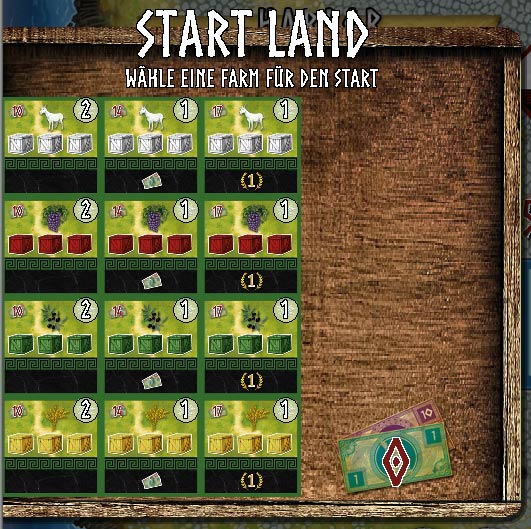
At the start of the game, each player receives, in addition to a starting capital of 30 Drachmen (25 for 4-5 players), also the order to purchase two farms for his farm. A raw material of the chosen type is also immediately obtained for these "Startland Industries".

Each action in the game must be confirmed after a selected selection with “OK” or can be terminated by means of “X” if this is allowed.
Field and operation
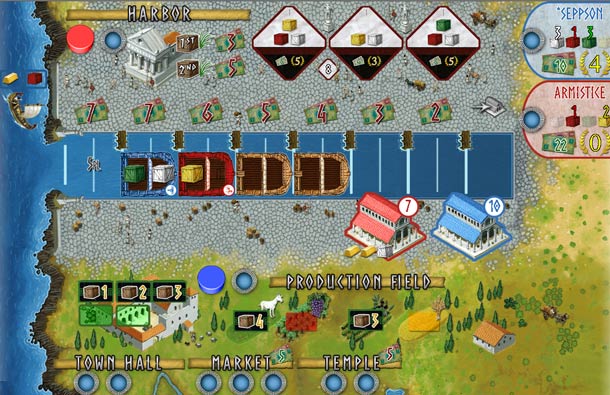
The game is played over several rounds. A round of games consists of 2 phases. In the first phase, reihum plays one of his 2 actions on the schedule.
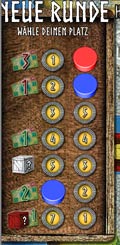
Once all players have completed their actions, a new player order is determined for the next round by selecting (in reverse player order) a place on the schedule and receiving rewards according to the place or having to provide additional costs.

ATTENTION: Whenever a cube is provided with a "?", this is a joker that can be exchanged to the desired goods/color by tapping.
Game actions
One has 6 different possibilities of action, each of which can be performed two per round if they have not already been executed by other players so often that there is no more "place" to perform the action.
Product

By selecting two types of production, the production which is to be triggered is determined. This production is distributed among all players reihum.
This action is replaced by selecting two of the available production plates to determine the quantity and then to place it on the respective farms to determine the type of production.
Since the distribution of the raw materials takes place in the player's seat sequence (one product per player), one can influence who receives more or less goods. (In order to obtain a product, an agricultural map with free space of the corresponding variety is required in its farm)
Boerderij
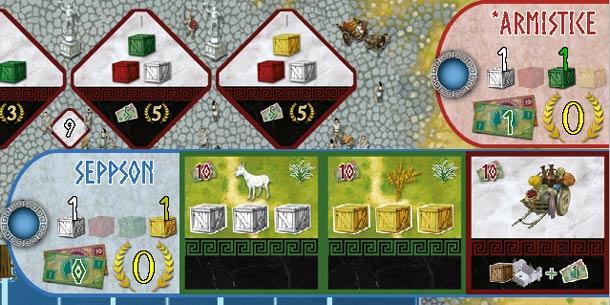
You can see the own and the farm of the other players by clicking on them. To execute the action you select the action location there directly. So each player can activate his farm once per round.
Activation gives the bonus of money and points of victory (in the lower part of the plate) from each of its court cards. In addition, you can use all the actions of your farm.
The use of the farm requires that at least one of its fully loaded vessels be taken to the port. In addition, one obtains a victory point or 2 drums per product on the loaded ship.
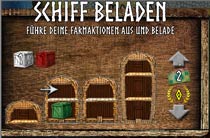
A ship of its choice is loaded by selecting a ship and raw materials. The arrows on the right in the window determine whether you would like to get points of victory or drachmen and see the complete "intakes". You can also use the other farm activities before loading.
Haven
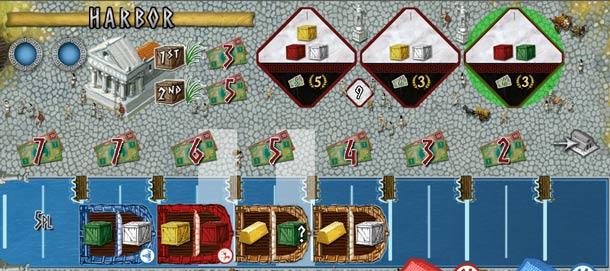
At the port there are two actions that do not both have to be used.
- On the one hand, you can buy goods from the port to its warehouse.
- On the other hand, you can fulfill an order to get the lucrative bonus for it.
At the port you can purchase as many goods by clicking on how you want and own Drachmen. The price for the goods at the port is above the ships. The warehouse cannot store more than 10 goods.
An order that you can still fulfill when you have the necessary raw materials in the warehouse is selected by antlers. (This is colored green if you can do it successfully.) The necessary goods for an order can be taken from the warehouse, from the current purchase at the port or also directly from its own estate. If goods are used from the estate (maximum 2 allowed), then it is necessary to pay expensively in Drachmen. (1 merchandise for 3 drachmas, 2 merchandise for 8 drachmas). The program automatically displays when selecting whether this order can be fulfilled and how much it may have to be paid.
Market
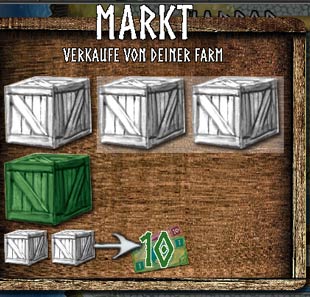
On the market you sell goods from his estate for Drachmen. It is important here to be there before the other players, because with each player who was on the market, the sales value is reduced by a drum.
Temple
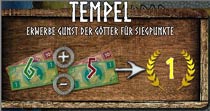
In the temple you can convert remaining dragons into victory points. Here as well as on the market, it is better to be in the temple earlier to have to pay less.
(1st player in the temple: 5 Drachmen for a victory point)
(2nd player in the temple: 7 Drachmen for a victory point)
City
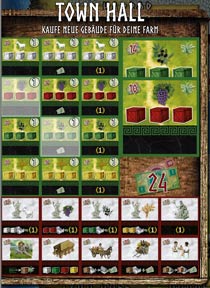
In the town hall you can expand your estate. You can buy different developments or new farms and build them in your own estate. New farms make it possible to achieve more profits in production. Developments give various possibilities for improvement, such as more storage space or the direct transport of goods from the estate to the warehouse.
List of developments
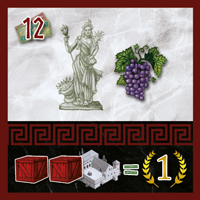
You get 1 SP for all 2 units of the corresponding product on your estate.
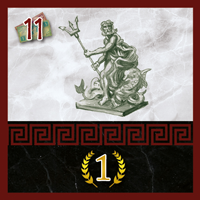
Poseidon gives a victory.
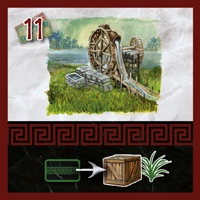
During the production phase, an additional unit is obtained for the harvest of a crop for which an agricultural map is used.
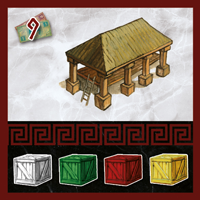
With this card you can store a unit of each product type. This is only possible if an agricultural map of this variety is present in the player's estate and this is full.
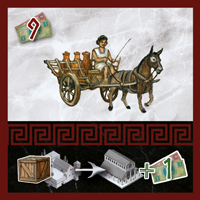
If you transport a product from your own agricultural map to your own warehouse, you get 1 Drachme from the bank for it.
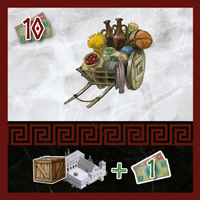
You get a product on your own agricultural map if there is sufficient storage space. Besides, you get 1 Drachme from the bank.
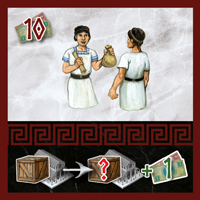
Thus, a product is exchanged from its warehouse for another desired product from the general stock. You can't make a gold with this! You also get 1 Drachme.
Speleine
The game ends with the round in which the completed orders can no longer be refilled with new ones. In this last round of games, it is exceptionally possible for each player to purchase goods and order at the port, even if all fields of action are already occupied by other players. However, only if he has not yet used the port action in this round.

